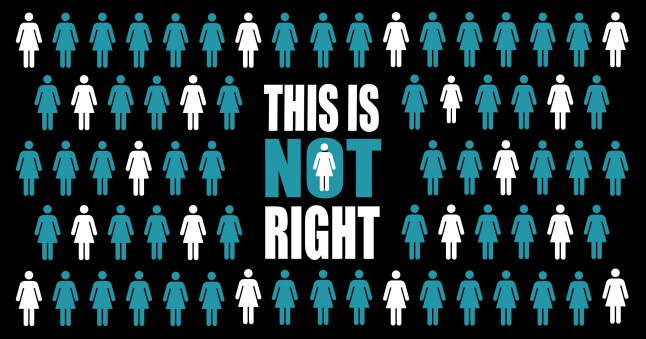
When I first met Alex*, I wasn’t in a good place.
A close friend had just died, making me reevaluate my entire life, and I suddenly felt an intense urgency to meet someone.
I met Alex on a dating app. On our first date, as he opened up about his childhood, I found myself pitying him.
He came from a wealthy family but had been shoved into the arms of nannies as a baby with parents who constantly bought him things instead of love.
While I wasn’t sure I liked him, nor found him attractive, he spent weeks flattering me, telling me he’d never felt this way about anyone before. Feeling depressed and anxious, I focused more on his feelings towards me, rather than mine towards him.
Little did I know, I would soon be subjected to months of what I later came to understand as a lesser known, but truly sinister form of domestic abuse.
What to do if you’re experiencing domestic abuse
If you are experiencing domestic abuse, you are not alone. And whether you are currently coping with or have made the decision to leave, you do have options.
- If you are thinking about leaving, domestic abuse charity Refuge suggests starting a record of abusive incidents, which might include saving pictures or messages, or making notes of times, dates and details of incidents.
- The next step is to make copies of important documents such as court orders, marriage certificates, National Insurance Numbers and your driving licence.
- In the meantime, identify the safer areas of your home so that you know where to go if your abuser becomes aggravated. Ideally, this should be a room with a phone and a door or window to the outside.
- If you feel ready to leave, start by making a plan for a safe, reliable route out. If you feel safe to do so, pack an emergency bag so that you leave in a hurry if needed.
- You can access a local refuge, either with or without children, for as long as you need to stay. The address is confidential. The National Domestic Abuse Helpline (0808 2000 247) is open 24-hours a day and has all the details of refuges in your area.
- In an emergency situation, ring 999 and ask for the police. If you aren’t able to talk, try the Silent Solution: after dialling 999, listen to the questions from the operator and respond by coughing or tapping your device, if possible. If prompted, press 55 to let the operator know it’s an emergency – you’ll be put through to the police.
Read more here.
Just a mere few weeks into dating, Alex asked to borrow some money. The apartment he lived in – bought by his mother, of course – had been ruined by a leak, and he’d been quoted thousands to fix it.
My first question was why his parents couldn’t lend him the money. After all, they were in a position to do so. But he said they wouldn’t loan him a penny.
Confused, I asked why. He explained that up until recently, he’d had access to an unlimited credit card, which had been cut off after blowing huge amounts in a short space of time. Like most of us, he’d now been forced to get an actual job.
He said he felt like a loser having to ask me for money, but wanted to prove to his parents he could sort things out himself. I told him I wasn’t sure.
This Is Not Right

On November 25, 2024 Metro launched This Is Not Right, a year-long campaign to address the relentless epidemic of violence against women.
Throughout the year we will be bringing you stories that shine a light on the sheer scale of the epidemic.
With the help of our partners at Women’s Aid, This Is Not Right aims to engage and empower our readers on the issue of violence against women.
You can find more articles here, and if you want to share your story with us, you can send us an email at vaw@metro.co.uk.
Read more:
- Introducing This Is Not Right: Metro’s year-long violence against women campaign
- Yvette Cooper’s message to abusers and rapists: The streets don’t belong to you
- Remembering the women killed by men in 2024
- Stories about violence against women don’t make an impact – this is why
- Men – we need your help to end violence against women
- What to do if your loved one is at risk from domestic abuse

After all, I barely knew him. But he insisted he was owed a lot from business investments and promised I’d get the money back within a few days.
Eventually, I finally agreed to lend him half the money and said I’d pay the builders myself. But he was adamant I pay him directly, explaining it would be easier. Ignoring my gut instinct, and without so much as a thank you, I did it.
Within a week, he returned half the money. I now had no reason to believe I wouldn’t receive the full amount back. But I never received the full amount back.
It wasn’t long before he said he needed to borrow more.

Soon, I was paying for everything. Whether it was a basic food shop or a bill, it didn’t matter. He’d stare at me blankly, waiting for me to take my card out. Despite admitting previous failed investments, he’d constantly push me to loan him money to invest in new businesses or in stocks and shares.
Whenever I’d ask for my money back, I was told it was coming: that he’d spoken to his business associates and there were some minor hold-ups.
After a couple of months, I checked my bank balance and was shocked by how much I’d spent in such little time. I sat him down and explained I didn’t have the finances to fund this lifestyle anymore.
This infuriated him. He claimed I was being ‘tight’ and said I’d never understand the pressure he was under amongst his social circle. After hours of screaming, the only thing that calmed him down was me apologising.
Bizarrely, in front of others, he’d pretend he’d paid for everything. There were times he’d pay for a group meal and then ask me to transfer the money back to him afterwards.
On another occasion, after months of saying how unattractive he felt due to his hair loss, I buckled and bought him a hair transplant. A couple of days later, I overheard him telling his friends that he’d treated himself to it as a Christmas gift.

My friends were horrified when, at a restaurant one time, he took my bank card from my bag and paid for the entire £400 meal when I briefly left the table. Unsurprisingly, they refused to hang out with him again.
People will ask why I didn’t leave earlier; why I allowed this behaviour to continue – a frequent misconception about domestic abuse that takes the blame away from the perpetrator.
The truth is, I did. I tried to leave – and did, successfully – a few times. But Alex had the incredible ability of playing the victim, as I now know is common behaviour among abusers to exert control. He’d insist that anything I lent him or paid for was ‘for us’: that we were building a future together, and I needed to learn to share.
If I ever said no, he’d throw a toddler-like tantrum that could last for days. He knew all the right things to say or do to make me submit or feel guilty. So, life became easier when I did what he asked.
One time, he threw a heavy suitcase and clothes horse at me for trying to leave. He’d scream until his mouth was frothing with foam, calling me abusive names and saying I wouldn’t amount to anything. He’d also repeatedly threaten to hurt himself if I left, saying life wasn’t worth living.
I felt embarrassed to tell anyone what was happening, and weirdly didn’t want people to judge him. As time progressed, I eventually made peace with the fact this was my life. He broke me down so much that I truly believed things wouldn’t get better.

Like many survivors of domestic abuse, the impact of the relationship on my wellbeing, coupled with being misunderstood by outsiders who did not see the true dynamics of our relationship, left me feeling trapped.
Our relationship finally – and thankfully – ended when I discovered he’d been cheating on me. It felt like I now had an excuse to leave that people would understand.
The aftermath was hard. When I broke up with him, I walked out the door and vowed never to see him again, and I didn’t. He accused me of lying about the money, saying that people were infiltrating my mind to extort him.
The breakup massively impacted my self-esteem and sense of self. I felt like I was going crazy or being made out to be a liar.
I’ve recently learnt Alex has done similar things to other women, and I now know there is a term for what we experienced: financial abuse, also known as economic abuse.

Learn more about Refuge
Refuge is the largest domestic abuse organisation in the UK. If you’re being abused, or are concerned about someone you know, Refuge can offer support.
Refuge helps thousands of survivors per day to overcome the many impacts of domestic abuse – from physical, to emotional, to financial –and works confidentially and individually with every survivor, tailoring a unique plan that meets her needs and helping her rebuild her life.
You can find out more about the charity here; and if you need help now, you can contact Refuge 24/7, for free, on 0808 2000 247.
This can take many different forms, from spending your money to putting debt in your name or preventing you from having your own bank account. It can happen to anyone, regardless of your job, income or class, but I want survivors like me to know that they are not alone.
Since the relationship ended, I began working alongside Refuge to raise awareness of the different forms domestic abuse can take. Now, for International Women’s Day, I have partnered with the organisation on a campaign to highlight the many red flags of domestic abuse.
To bring this campaign to life, an immersive installation at Outernet in London will be opened on March 8, displaying physical red flags with audio testimonials from survivors. Alongside a number of other Refuge ambassadors and supporters, I have lent my voice to these testimonials so that survivors can be heard.
As a survivor myself, I know all too well the lasting impact of domestic abuse. Despite the numerous bank transfers, Alex has continued to claim I was lying about the abuse I was subjected to.
While I realise I won’t get the money back, I now understand this shame is no longer mine to carry. I only hope that speaking up about it may help someone else leave.
Do you have a story you’d like to share? Get in touch by emailing jess.austin@metro.co.uk.
Share your views in the comments below.
